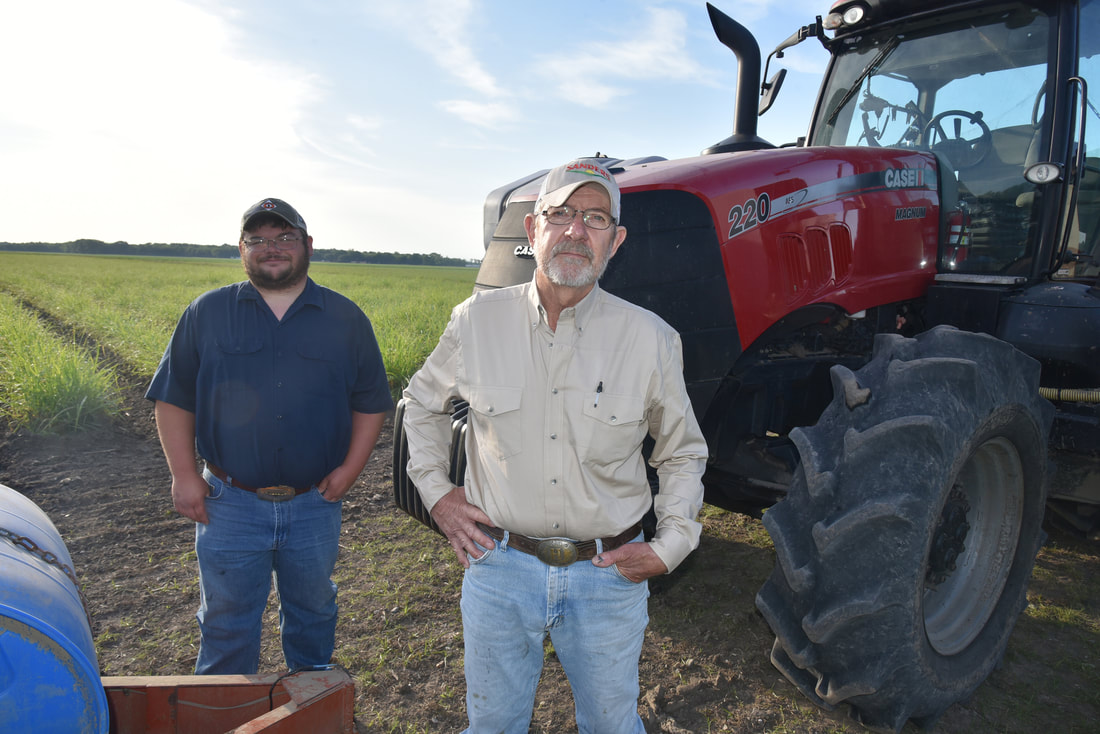Iberia Parish Sugarcane Farmers Carrying on into Fifth Generation of Agricultural Adaptability5/1/2023 Story and photos by Derek Albert LOREAUVILLE, La. – On a mild morning in early May in rural Iberia Parish, the damp air carries the sound of distant church bells and the gravely hum of a pump motor. As the pump churns gallons of water and fertilizer in a pair of mounted saddle tanks, something else is churning—the thoughts of Iberia Parish sugarcane farmer Raymond Hebert.
Hebert, and son Josh were awaiting what the pair said was their last delivery of fertilizer for the young crop as they paused to discuss the progress of the 2023 sugarcane season. For farmers like the Heberts, annual seasons are not marked as winter, spring summer and fall. Their annual calendar reads: planting, in August; harvest of the prior crop, September through January; and a long growing season required to produce a viable tropical crop in a subtropical climate. From Hebert’s vantage point, this year, the weather has offered farmers a slow start to their crop that will be harvested this fall. Hebert said the mild—and at times, cold--trend has persisted since last fall. “What hurt us more than the late freeze and frost was that after that it just stayed damp and cool,” Hebert said. “We didn’t get a lot of sunshine. It was just poor growing conditions.” But as we flip the calendars to May, temperatures are on the rise, and so is the crop. While the crop height ranges from a few inches to nearing-a-foot tall, Hebert is applying ever-important fertilizer which will help the crop grow but will also shrink his bottom line. Rising input costs have made producing a profitable crop a little more difficult in recent years. “The sugar price is up. So, that’s a plus,” Hebert said optimistically. “We need that above-average crop to cover that cost,” LSU AgCenter Sugarcane Specialist Kenneth Gravois corroborated that the mild weather has perhaps slightly slowed the growth of the crop. “The weather in April has been cooler than average and slightly wetter than average,” Gravois said. According to Gravois, the forecasts call for the mercury to rise as Louisiana progresses through spring. The warmer temperatures are poised to speed the crop’s growth, he said. “Cane will respond to warm temperatures,” Gravois said. “I’m still optimistic on this crop to be pretty decent.” “There are always isolated trouble spots in a crop but when you take a look at the crop as a whole, it’ll always catch up. In early May, with the forecast that we have, the crop’s going to jump up and start moving. From here on out, it’s going to be up to the genetics and good weather.” Gravois said the milieu where Hebert farms is near the geographic center of the state’s sugar-producing areas The serpentine Bayou Teche, that meanders through Iberia Parish, has provided the area with healthy soils that have been the foundation for more than 200 years of sugarcane production in the area. “Now, like other areas in the South, they have their fair share of heavy, black land but we have better varieties--like (L01-)299-- that do so much better in black land than things that we've been used to growing.” Hebert said Louisiana sugarcane farmers have adapted their crops to succeed in an area where sugar cane was not best suited. Through generations of farming practices, farmers have coaxed the crop to grow in less-than-ideal soils, in a les-than-ideal climate. “When you put good research with good land and good farming practices by good farmers, then, it’s hard not to be optimistic,” Gravois concluded. Hebert, who—like three prior generations of Heberts-- has farmed sugar cane here for nearly five decades, began alongside his father, Phillip. He said as a younger farmer, he aspired to farm 500 acres and be what he considered to be a “big farmer.” Now, with a 800-acre footprint he said he has a comparatively smaller operation. He said he had made the decision not to expand further by a choice of his managerial philosophy. “I could’ve expanded more. I had the opportunity,” Hebert said. “But I wanted to stay on a piece of equipment every day. I want to be totally hands-on.” But even with decades of farming experience, Hebert cannot do it all himself. His son Josh followed in his father’s footsteps to carry on the Hebert tradition of farming sugarcane. While farming, the 34-year-old has created a niche hobby for himself in a sector that his agrarian brethren have not all fully embrace—social media. The younger Hebert posts photos and videos of his farm duties from the cabs of their farm equipment. Sometimes he’ll post photos of a picturesque sunset, or sometimes it’ll be of the tractor he's in that day, but whatever it is that he posts, it will certainly be near a cane field. His passion for farming was evident when he submitted a winning entry for the Louisiana Farm Bureau Federation’s Farm Proud contest in 2022. “I love being a part of Louisiana agriculture because I love seeing the crops grow, working for my father and working countless hours caring for the crop and the equipment,” he wrote. “Louisiana agriculture, along with the Louisiana sugarcane industry, will always be a part of me.” As a reward for his entry, he earned a rather coincidental and apropos prize—a GoPro camera. With that he has posted several videos and photos that show he is just as comfortable behind the lens of a camera as he is behind the wheel of a new red tractor. Though Mother Nature may offer less-than-advantageous weather and soil conditions, Hebert said farmers have adapted to producing sugarcane here in Louisiana for more than two centuries and 2023 will prove to be no different. “This is my 48th crop and I’ve learned something different every year,” he reflected. “There are never two years alike.”
0 Comments
Leave a Reply. |
|


 RSS Feed
RSS Feed